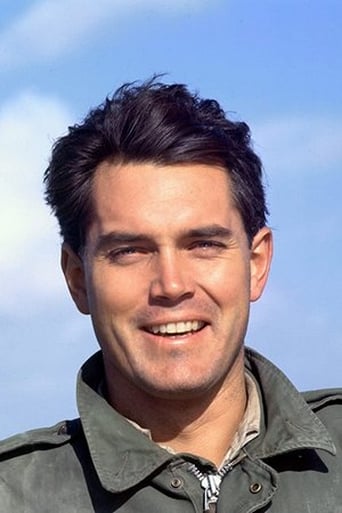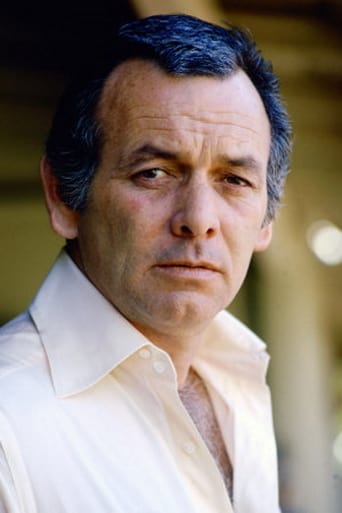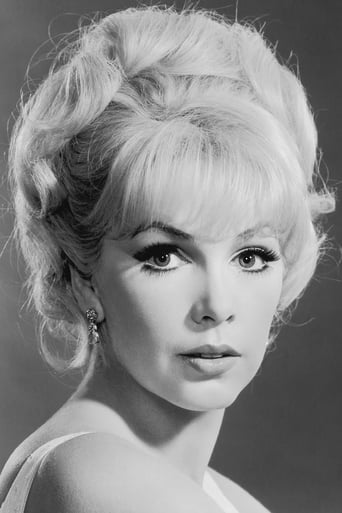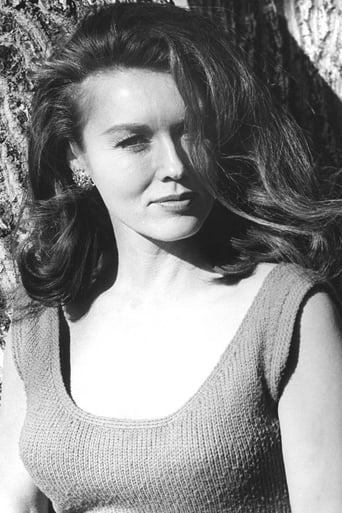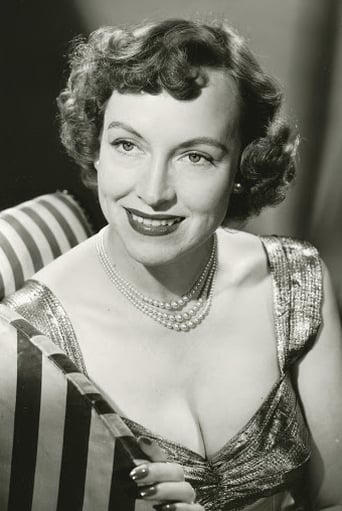Mjeteconer
Just perfect...
Matialth
Good concept, poorly executed.
Pacionsbo
Absolutely Fantastic
Scarlet
The film never slows down or bores, plunging from one harrowing sequence to the next.
gordonl56
MAN-TRAP – 1961This late cycle noir is the only film directed by actor, Edmond O'Brien. It is an economically filmed throwback to the hey days of film noir. Good guys, bad guys, the sap, and of course the femme fatale. David Janssen and Jeffery Hunter are Marines on a behind the lines patrol during the Korean War. Hunter rescues a wounded Janssen from a Red ambush, and drags him back to safety. Hunter also gets wounded during the action. Janssen promises to pay Hunter back with a boatload of cash someday. Flash forward 9 years, and we have Hunter as junior member of a construction outfit. He is not happy at all with his life. The company is owned by his father-in-law, Hugh Sanders, and Hunter is married to his daughter, Stella Stevens. Stevens has turned out to be a witch, who is making Hunter's life a misery. All she is interested in is, booze and partying. Hunter is sure that Stevens has a few outside interests as well. Hunter has himself been stepping out with the company book keeper, Elaine Devry.Out of the blue now, appears Marine buddy, David Janssen. Janssen seems to have a fist full of cash and wants Hunter to join him in a deal. They hit the bars and Janssen fills him in on a scheme. Janssen claims to work for a South American type, who is coming to the States to buy 3.5 million in weapons for his government. Janssen has a plan to lift one million off the top for themselves. Janssen always said he would pay back Hunter for saving his life in Korea.Hunter is not at all happy with this idea. But it would allow him a fresh start away for his shrew of a wife, and her overbearing father. He needs time to think about the matter. It does not take long as Miss Stevens says she has had enough of Hunter and tells him they are through. Hunter decides to join Janssen on the "perfect" job as Janssen describes it. What Hunter does not know is that there are agents of the South American government keeping tabs on Mr. Janssen. They figure he is planning a job and they are here to retrieve the cash for their own purposes. Needless to say the job goes sideways when they grab the suitcase of cash at the airport. Shots are exchanged with Janssen catching one in the shoulder. There is then a top flight chase into downtown San Fran with Hunter and Janssen just barely escaping. Janssen is put up at Hunter's house to recover from his wound. The money is stashed, so all they need to do is wait for the heat to cool off.Instead, the heat rises, as Stella Stevens puts the moves on Janssen, who is not the least inclined to resist. This leads to problems between Hunter, Stevens, Janssen and the maid, Virginia Gregg. Hunter moves Janssen out to another hideaway to finish recovering. Miss Stevens, in a drunken rage, trips and goes for a tumble over the upstairs railing. Of course she snaps her neck. The maid, Gregg, sees the incident and leaves. She does not know whether to report the death or just be quiet. Hunter returns home and finds the wife in a heap on the floor. He is also at a loss as to what to do. He had threatened to kill her in front of party guests a few days before. Would the Police believe him if he told them he had nothing to do with Steven's death?Hunter plants Stevens under the foundations of a house where they will be pouring concrete the next day. He then takes all the cash to Janssen and tells him to blow to Mexico. He gives Janssen Stevens' sports car and tells him he never wants to see him again. He hopes that the Police will think Stevens has ran off. Needless to say this idea falls to pieces as the maid, Gregg, decides to come forward. "Where is the body?" ask the Detectives of Hunter. Matters go no better for Janssen south of the border. A much better film, than I am making it sound like. Stella Stevens is excellent as the hip swinging femme fatale. Hunter is also quite good as he slowly unravels under all the pressure. The end bit with Janssen gets his comeuppance is top flight. Well worth a look.
MartinHafer
The main reason I watched this film is that is was co-produced and directed by Edmond O'Brien--one of my favorite film noir actors. Also, while I can't prove it, I think he dubbed the voice of the photographer late in the film. Unfortunately, while this is a noir film, it's not nearly as good as any in which O'Brien himself appeared.As far as the film goes, it's a very strange melange of several plots--and I think one or two would have made a good film--but not ALL of them. First, Jeffery Hunter is married to Stella Stevens. She is a NASTY person--a drunk and quite histrionic. She will say and do anything to gain attention and often claims that Hunter is an abusive husband--even though he clearly is the abused spouse. In fact, he's been pretty much emasculated by this horrid woman. This is an interesting plot. Second, after putting up with all this abuse, Hunter finds a girlfriend and they talk about his getting a divorce. In the meantime, Stevens accidentally dies and since she's always claiming he abuses her, he panics and buries her! Third, when the film begins you see Hunter save a buddy (David Janssen) during the Korean War. Years later, Janssen approaches Hunter with a scheme to get rich robbing some evil South American strong-man. Janssen is shot in the process and later, when being nursed back to health in Hunter's home, Janssen is caught making out with Stevens!! Later, Janssen runs away to Mexico while the South American dictator's men catch up with Hunter and deliver a beating. Inexplicably, one of the toughs INSTANTLY diagnoses Hunter as now having amnesia from an injury in the war AND they just triggered it with the beating!! And, further beatings wouldn't help...so they leave him...alive!!! There's even more to the film than this (including a wife-swapping club attended by the neighbors--one of whom is, ironically, Bob Crane) but none of it works. It's like many different plot threads that are just haphazardly tossed together. None of it makes a lot of sense and the film just came off as second or third-rate.
Brian Camp
MAN-TRAP (1961) offers an unusual crime drama of a wounded Korean War vet who gets embroiled in a robbery caper with a war buddy whose life he'd once saved. It's got a trio of intriguing lead characters and a set of unpredictable twists and turns that never defy logic. Other than a couple of well-staged action scenes, the film avoids making concessions to genre conventions or established formula. The whole thing is character-driven and rarely do you feel the filmmakers pandering to the audiences' expectations. In fact, it plays like a faithful adaptation of a good crime novel and was indeed based on one, "Soft Touch," by John D. MacDonald ("Cape Fear").The film opens with a Korean War scene (filmed rather cheaply on a California beach) in which Matt Jameson (Jeffrey Hunter) rescues Vince Biskay (David Janssen) from Chinese riflemen and gets shot in the head as a result. Vince promises Matt that, "If I ever make any money, a lotta money, half of it's gonna be yours." That one line handily and dramatically sets up the premise for the rest of the movie. Cut to eight years later. Matt has a silver plate in his head and is having serious marital and financial woes when Vince shows up out of the blue with a proposition. He's been working for a South American government and has been sent to the U.S. to intercept a cache of money earmarked to buy guns for rebels seeking to overthrow his employers. It's for a good cause, Vince insists, and Matt will be paid a half-million dollars if he acts as driver when Vince goes to San Francisco Airport, in disguise, to pick up the courier.Once they get to the airport, of course, things go awry when the shooting starts, thanks to rebel representatives with ideas of their own. Matt soon finds himself caring for a seriously wounded Vince, while stashing the money, of which he now wants no part, and trying to stay one step ahead of pursuers. Things spiral from bad to worse when Matt's wife (Stella Stevens) freaks out in an alcoholic rage, with horrific results, and the rebels catch up with Matt. Matt's amnesia soon kicks in and the chance of a happy ending seems impossibly remote.The airport confrontation is quite clever, especially since it coincides with the arrival of a teen pop star and crowds of teenage girls surrounding him. It's followed by an exciting car chase from the airport into San Francisco and through the streets of the city, a good seven years before BULLITT put San Francisco car chases on the map. (BULLITT also had a shootout at San Francisco Airport.) It's an intricate tale of an innocent man caught up in a crime of opportunity when he's at his most financially vulnerable. Matt's an honorable man who tries to do the right thing at every stage, often at great cost to himself. But he's so uncomfortable and unhappy at all times that we kind of secretly wish he'd just lighten up, take the money and run off and start a new life. But the film doesn't make it easy for us. Janssen's Vince Biskay is quite a snaky character, charming and loquacious one moment, hard-bitten and dangerous the next. It's a side of Janssen we didn't often get to see. Nina, Matt's wife, is played by Stella Stevens as quite a wild number, given to hard drink at all hours of the day and flirtatious behavior whenever and with whomever she wants. She's so damned cute and sexy and has such an inviting smile, it's hard to dislike her, no matter how much of a lush and a slut she turns out to be. The film really perks up during her scenes, leading me to think that Stella just might outrank all her other hot kittenish blond contemporaries (Tuesday Weld, Connie Stevens, Ann-Margret). Elaine Devry co-stars as the helpful and understanding office secretary with whom Matt is having a rather chaste affair.Matt's suburban neighbors are a noisy and intrusive bunch, given to parties and heavy drinking whenever we see them. Future "Hogan's Heroes" star Bob Crane is one of them. They play a naughty game called "Braille," in which the wives lie on floors covered in sheets and the husbands have to use "braille" to determine which covered figure on the floor is their wife. This was pretty hot stuff for 1961.The film was directed by actor Edmond O'Brien (D.O.A.) who does not appear in the film at all. O'Brien also co-directed SHIELD FOR MURDER (1954), a gritty thriller in which he starred as a corrupt cop. I saw both films practically back-to-back. I'm impressed. There are some scenes in MAN-TRAP that have way too much dialogue and are a bit overwrought, but, overall, I like the way the film mixes urban crime drama, caper film, international politics, marital dysfunction, suburban decadence and a lone hero's moral dilemma all in one enticing package. Now I need to track down the novel.
dougbrode
There are a few distinctions to this film, one being that it is the only movie ever to have been directed by Edmond O'Brien, the 1940s leading man who, a decade later, put on a great deal of weight and turned into a top character actor, even winning a Best Supporting Actor Oscar. Once was enough as a director, though, for this crime thriller appears to be an imitation of the film noirs that O'Brien starred in (most notably, D.O.A.) earlier in his career, and that genre had all but disappeared from the screen by the early 1960s, only to be revived again toward the end of the century and at the beginning of the next, via neo-noir - which even included a disastrous remake of DOA with Dennis Quaid. But I digress . . . one of the other distinctions is the re-teaming of Jeffrey Hunter and David Janssen, who had worked together very well a year and a half earlier in a far better and more ambitious film, Hell to Eternity, a big scale WWII action flick. In between, Hunter had played the part of Jesus in King of Kings and, after that, he seemed desperate to do anything to try and distance himself from the image of purity he incarnated there. That included second rate 'programmers' (as studio B movies used to be called) in which, at the very least, he could remind audiences of the differing roles he was capable of playing. Hunter blew his last big chance for success, incidentally, when a few years later he listened to the lady in his life when she told him NOT to do Star Trek! Anyway, the third reason to take a look at this flick (don't go out of your way, mind you) is to catch Stella Stevens displaying her range of talents and reminding us that, in addition to a ditzy-glitzy blonde in comedy roles, she could do a femme fatale just fine. She may have third billing behind the boys, but this is her show all the way, and whenever she's on screen, sparks fly - as they do nowhere else in this minor movie.
